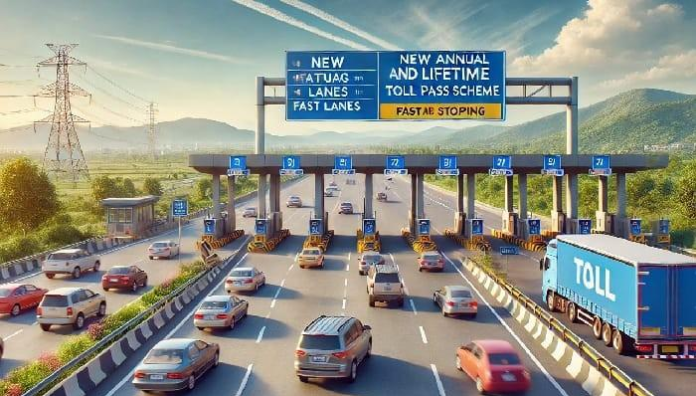Government Proposes Annual and Lifetime Toll Passes to Ease Highway Travel Costs
The Indian government is likely to introduce a new toll pass system for private car owners. This system will offer two options: an annual toll pass priced at Rs 3,000 and a lifetime toll pass for Rs 30,000, allowing unlimited use of national highways. The proposal, which is in the advanced stages of discussion within the Ministry of Road Transport and Highways, aims to address several issues associated with tolls, including high rates and the frequent toll plazas along major highways.
For middle-class families and frequent travellers, the cost of tolls on national highways can add up quickly. The current toll system involves paying at multiple toll plazas, with users often facing significant charges. With the new toll pass proposal, private car owners can pay a one-time fee for unlimited access to the national highway network. The annual toll pass, priced at Rs 3,000, will be far more affordable than the current monthly pass system, which costs Rs 340 a month, or Rs 4,080 annually. Meanwhile, the lifetime pass will cost Rs 30,000 for a 15-year period, providing a long-term solution for car owners who frequently use the highways. Sources say the new toll passes will be integrated with FASTag technology, ensuring ease of use without requiring new passes to be purchased regularly. This integration will also streamline the toll collection process, allowing private car owners to bypass long queues at toll booths.
The government’s proposal comes in response to growing dissatisfaction over the existing toll system. Many highway users have voiced concerns about the high toll rates, especially in areas where toll plazas are located at frequent intervals. For many, the tolls represent a significant financial burden, particularly for those who use highways daily for commuting. Union Minister for Road Transport and Highways, Nitin Gadkari, has said the ministry is keen to resolve these concerns through the introduction of these new toll pass options. Additionally, the proposal is seen as a solution to the frequent issues of traffic congestion at toll plazas, which often result in delays and driver frustration.
While the new toll pass system is expected to reduce individual toll expenses for frequent commuters, sources within the government suggest that the National Highways Authority of India (NHAI) does not anticipate significant revenue loss. The toll passes will be priced in such a way that, over time, the NHAI will be able to maintain its revenue flow. However, in the initial years, the NHAI may forgo some income as users transition to the pass system. Interestingly, data from the toll collections in 2023-24 reveals that private cars, while accounting for 53% of the toll transactions, contribute only 21% of the total toll revenue. This shows the disproportionate cost burden on private car owners, prompting the government to offer more affordable toll options.
The introduction of the annual and lifetime toll passes is just one part of the broader strategy to modernise India’s toll system. In addition to this initiative, the government is exploring ways to adjust toll rates based on distance travelled, which could further reduce costs for commuters on longer journeys. Moreover, the ongoing efforts to streamline toll collection through FASTag technology and remove congestion at toll plazas are expected to improve the overall driving experience for highway users. As the Indian government prepares to roll out the annual and lifetime toll pass options, many frequent highway users are expected to benefit from the reduced financial burden. With a focus on affordability, convenience, and efficiency, the new toll system could serve as a significant improvement to India’s national highway infrastructure, helping commuters save money and time on their journeys.


